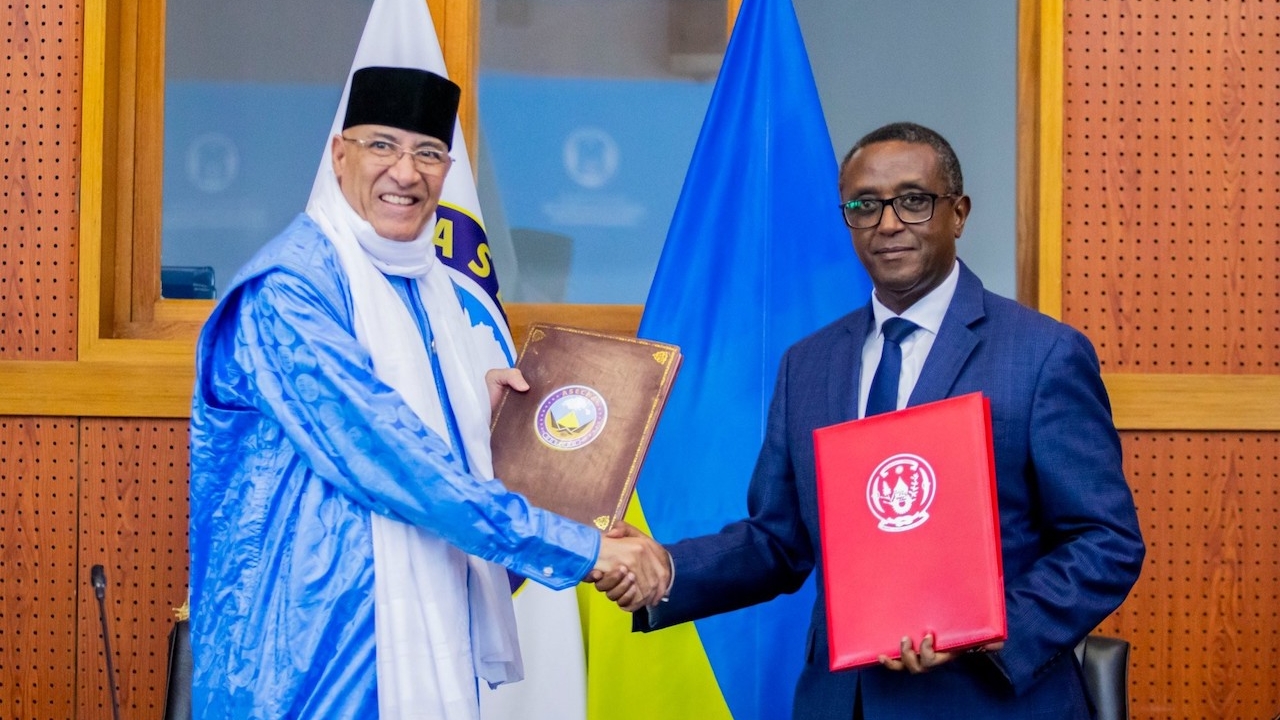Rwanda joins ASECNA's roadmap
Rwanda is officially the 19th member of the Agency for Aerial Navigation Safety in Africa and Madagascar or ASECNA (L'Agence pour la Sécurité de la Navigation aérienne en Afrique et à Madagascar), since last January. It’s director general Mohamed Moussa said that this will further strengthen the agency’s footprint as it pursues its efforts to bring new solutions, enhance airworthiness and boost integration within African skies.

Rwanda Foreign Minister Vincent Biruta (right) and Mohamed Moussa, Director General of ASECNA, at the signing. Image: ASECNA
According to Mohamed Moussa, Rwanda's accession will open up new perspectives. "It will also enrich the vision and practices for the governance and operation of our air navigation services.
“It is the culmination of a long process and above all the crowning achievement of a vision carried by ASECNA for almost 15 years; that of a Single Sky for Africa within the framework of a reinforced cooperative management of airspace."
This form of management should lead to the standardisation of regulations and procedures for training and operating services throughout the African continent.
According to ICAO, the next 20 years will be a period of transformational change for the aviation sector, especially for air traffic management (ATM) and flight operations.
Satellite navigation is the future of global civil aviation and ASECNA, which is at the forefront of technological development, carries the ambitions of Africa in this field, respectful of all required safety and sustainability objectives.
"Our ambition for 2024 is to strengthen and consolidate what we have achieved. We will continue to deploy all continent-wide projects, including the African Flight Procedures Program FPP/AFI office. This programme is of paramount importance for African civil aviation in view of the forecasts of air traffic growth on the continent in the coming years," said Moussa.
ICAO has chosen ASECNA to host the programme.
The agency will also focus on a Satellite-Based Augmentation System (SBAS) for Africa and the Indian Ocean initiative. SBAS, known as Augmented Navigation for Africa (ANGA), is similar to the European Geostationary Navigation Overlay System (EGNOS).
It will provide a safety-of-life service enabling the safe use of GPS signals for air navigation during all phases of flight, from en-route to landing. It will thus improve the safety and efficiency of flights, while reducing their negative impact on the environment. The system will also offer an open service with a higher accuracy performance than standard GNSS systems.
The services provided will comply with ICAO standards and recommended practices and will be compatible with SBAS avionics already deployed in fleets of commercial aircraft.
"Beyond the political and operational challenge for ASECNA to have its own means to improve and secure air traffic management, ANGA will take up a major technical challenge. It is the first system of its kind to be deployed in the equatorial zone, and as such it is the first SBAS in the world to provide a service despite ionospheric disturbances that are at their maximum around the equator," pointed out Mohamed Moussa.
The implementation of SBAS with community capacity is a further step towards building a uniform sky for Africa.
Stay up to date
Subscribe to the free Times Aerospace newsletter and receive the latest content every week. We'll never share your email address.


